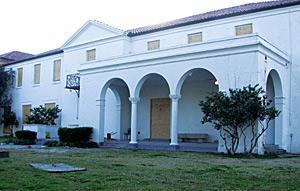After months of investigating allegations of hazing, the Dean of Students on Dec. 18 officially rescinded the recognition of Delta Chi Fraternity, effectively removing the fraternity from campus.
The Greek Affairs and Judicial Affairs units of the Dean of Students Office found evidence supporting allegations of hazing — any instance of physical abuse or psychological abuse associated with or involving members of an organization.
Kevin Price, dean of students, said the University found new members were paddled, yelled at and harassed, expected to perform excessive calisthenics, such as push-ups and running, and required to do other members’ laundry.
New members also participated in “Hell Week.” During Hell Week, new members did calisthenics, ate unappetizing food and were subjected to sleep deprivation. A new member also was singled out to be taken off campus, where he was stripped to his boxers, had his head covered with a pillow and was physically abused.
These charges violate University Policy Statement-52, which states the University holds all student organizations accountable for any activities or actions which result in harm or constitute a hazard to health and safety.
Delta Chi President Robert Edwards did not return telephone calls for comment.
If an organization is found to violate this policy, the Dean of Students can take actions ranging from a letter of University reprimand to revoking University recognition.
“Hazing, particularly activities that endanger the physical well-being of students, cannot be tolerated at Louisiana State University,” Price said. “The seriousness of these violations has necessitated a loss of recognition as a University student organization.”
Victor Felts, assistant dean of students and director of Greek Affairs, said as situations arise, the Office of the Dean of Students has an obligation to pursue each situation.
The Reveille reported last semester six of 18 fraternities were on educational probation for hazing or alcohol-related violations.
One such fraternity, Phi Gamma Delta, is on probation until March 22 for personal hazing. Felts said the Dean of Students took different actions against Phi Gamma Delta than against Delta Chi because the extent of the Delta Chi hazing was much more severe and harmful.
Felts said the charges against Delta Chi dealt most importantly with physical hazing, but it was not an isolated incident.
“It was an isolated incident that brought it to our attention, but it has occurred over a period of time,” Felts said.
Though loss of University recognition does not require a fraternity to vacate its house, Price said the alumni members of the house corporation informed the members of their intention to close the house and surrender the charter Dec. 15.
Felts said the house corporation can decide what to do with the house, but the Office of Greek Affairs has referred Delta Sigma Theta, a National Pan-Hellenic Council sorority, to the Delta Chi house corporation.
Felts said the sorority has been looking into getting a house on campus, and this will allow them to move in the right direction, since the Delta Chi house is vacant.
The Delta Chi Fraternity can request to re-establish a fraternity on campus Jan. 1, 2005, Price said.
The period for an organization to remain off campus can last anywhere from two to four years, but it depends on the severity of the incident, Felts said.
Price said the relatively short period before reconsideration reflects the fact that Delta Chi self-reported the incident, revoked the chapter’s charter and has been cooperative and forthright at different levels.
Felts said the Delta Chi advisers received an anonymous call concerning a hazing incident, and they called the national headquarters. After the headquarters finished its investigation, the president and headquarters’ representative met with Felts to report the charges.
If Delta Chi chooses to request University recognition after their two year removal, the Interfraternity Council will decided whether to allow the fraternity back on campus.
“Should Delta Chi Fraternity seek to establish a new colony at LSU in the future, it is our expectation that this organization will strive to complement the overall mission of the University by providing LSU students with a safe, responsible and constructive environment that fosters mutual respect among all members, as well as other members of the University community,” Price said.
In an unrelated incident, NPHC fraternity Alpha Phi Alpha is being investigated by its regional advisers for violating their intake process.
Felts said each NPHC fraternity and sorority has a different and structured process of getting new members. Most have a one- or two-week process of inducting new members.
Alpha Phi Alpha allegedly interviewed a person without contacting regional advisers. The fraternity did not violate any University policy and therefore is not on probation by the University. The Office of Greek Affairs is awaiting news from the regional advisers to see if Alpha Phi Alpha will be placed on suspension.
Four other fraternities remain on probation. Acacia and Sigma Chi both are on probation until Jan. 31 for hazing violations. Phi Gamma Delta is on probation until March 22 for personal service hazing and Pi Kappa Phi is on probation until Oct. 17, 2003, for alcohol violations.
Allegations result in fraternity’s suspension
January 21, 2003

Allegations result in fraternity’s suspension



